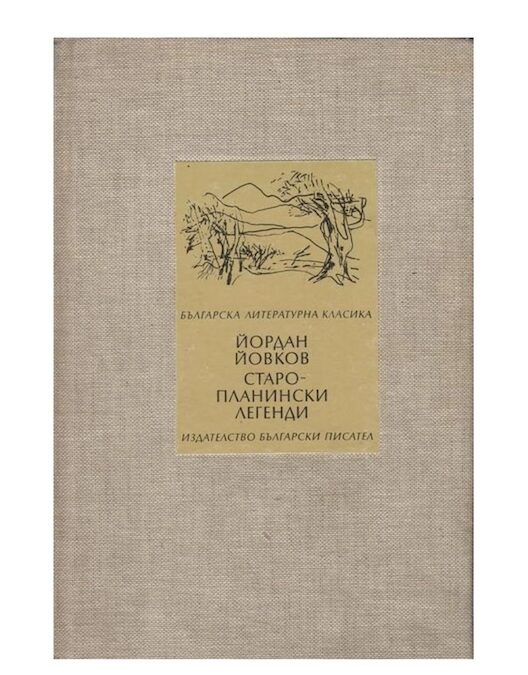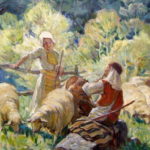“And he saw her as he had seen her when she held the needle with the thread in her mouth, looking at him and smiling – her smile being a song to his soul, and her eyes, two eyes, two eyes of soft light into which he had fallen instantly and his whole world had changed. “Not a needle,” Shibil thought again and sighed. “She can hold a knife like that in her mouth, and I’d gladly die from that knife!””
Today I’ll take you to the spiritual lands of Bulgaria, along the cobblestone streets dating back to the Thracians and Ancient Bulgarians from 4th BC. There, in old houses and texts are many voices and many stories, some told while most aren’t; but there, are also old books from beautiful writers, and I’ll open the pages of one such old book today – telling you the powerful love story Shibil (Шибил). The cover photograph is by me of one of the oldest towns in Bulgaria, Lovech. Its first inhabitants were the Thracians dating back to 4th BC. Lovech is very dear to my heart, and truly a beautiful town surrounded by mountains, nature, caves, preserving the history it holds and the voices of love, family and wisdom.
First published in 1925, Shibil is a short story written by the 19th century prominent Bulgarian writer Yordan Yovkov. Shibil is part of Yovkov’s book of short stories Legends of Stara Planina/Old Mountains (Старопланински Легенди), also known as Balkan Legends, (1927).
Known for his emotional yet grounded and wise way of language, and with his ability to express and capture the deeply spiritual wisdom within the ordinary and very humane experiences of life and people, Yovkov shows us the transformative power of love. When the hands of love touch us, we can’t resist surrendering to it and nothing and no one can stop our moving towards us; because love’s destiny is to fulfill itself, and it always does.
His tales are morally and wisely beautiful, illuminated by an inner spiritual light. His characters are often more quiet while longing, living in remote villages and part of the country or from humble backgrounds, which contributes to the romantic remoteness of the legends of ancient times preserved in the folklore. His characters are also often detached from reality at first glance, which provokes thought and introspection. The spirit then travels to the past and then meets into the present with the awareness brought forward from echoes of memories; and what was once experienced now comes to life with voice, light and colours and emotional and spiritual aliveness. Yovkov often takes us into a world of kindness and beauty, and spiritual wisdom, through the filter of time.
For Yovkov, true beauty was not merely the physical but the spiritual essence of someone; and when a woman possessed it all with the integrity and purity of her spirit, her love became one to tame even the greatest beasts. Morality was something central to Yovkov’s characters and stories, and his male characters often were seeking ways to live a life of moral compassion, virtue and integrity.
Shibil
During the years of the Ottoman slavery in Bulgaria, Shibil was a scary outlaw, a haidutin (хайдутин), who lived in the forest with her fellow men. As a side note: The word haidutin is used to describe the so-called “outlaws” living in the forests, the men who lived with the eagles; but more commonly, in Bulgarian history and folklore it refers to the real life men who stood against the Ottoman slavery and assaults on the native Bulgarians.
The haidutins often protected and freed and saved the women and children from the assaults and horrible violence upon them. The righteous haidutins are highly respected in Bulgarian folkore and history because they were the real life heroes who gave their own lives in order to save the women and children and they fought for the country’s freedom from slavery, as well as fighting against all kinds of injustices on the locals and small villages where the people were vulnerable and no one cared for them.
But of course, not all haidutins were great people; some were thiefs, robbers, and pretty horrible men who also harmed the common people. In our story today Shibil was a scary robber, the powerful leader of a group of robbers, who with his men lived hiding in the forests and they’d steal jewels from the caravans of traders who’d pass through his trails. He was known to be very scary and strong and people would tremble just at hearing his name; he was long searched to be captured and had earned himself a high price for his head. Our story begins with him actually going down the mountains, coming away from his hiding, and going into the village to surrender himself.
“Shibil, the terrible bandit, who was sought under wood and stone, came down the mountain and went to surrender. Tomorrow this news would be heard everywhere, who would believe it? Shibil cared little for that. He was in a hurry and thinking about something else.”
With this first sentence we understand that his thoughts aren’t even about his capture – it is something else. And what the something else is a woman. It is a woman he loves. And for a chance to come close to her and see her even if only once again, knowing full well he may be killed on that way, he is still willing to come out of hiding and go into her village. The story then takes us back in the memories of Shibil of how he met his Rada, and his whole world changed, internally and externally.
We are taken back to a few months ago, when while roaming the forests, Shibil and his men meet a group of women, richly dressed and adorned with jewellery. This was quite unusual because no man would allow his daughters and wives to go unprotected in these forests where Shibil and his men lived. The jewels were sparkling and templing, and Shibil and his men approached the women.
One of the women named Rada, the daughter of one of the richest men Veliko Kekhaya, looked at Shibil who was standing tall in front of her, and calmly she spoke, directly looking him in his eyes, “Bray! Move and go about your business! Aren’t you ashamed to stand here in front of us, what do you want from us women?”
Shibil looked at her from up to down, and with awe for her courage thought, “What a white face! And thin in the waist, and the skirts are wide, like a doll. And what courage!” His eyes twinkled tempting him to laugh, but Rada laughed out loud before him. Her face brightened, and she became even more beautiful, and now you could see that her eyes were blue and light. Shibil looked at her in astonishment thinking, “What kind of devilish charm is this, what kind of devil must she be to be so beautiful and tempting and courageous?”
And what happened then, and how his mind and heart were immediately lost in her eyes, Shibil didn’t even know how it happened. He didn’t catch the beginning of it; we rarely know when love begins but we always know when it’s begun. Helplessly and senselessly he was captured by her pure light beauty and her laughter that became a song for his soul.
Rada too seems enchanted by the rugged bearded bandit, “Look,” she said, pointing with his arm, “look how your sleeve is torn. Wait, I’ll sew it up!”
And before he knew whether she was joking or not, he saw her right in front of him with a needle; he could see the moss on her gentle face, her red lips, and when she looked at him, her eyes flooded him with a soft and sweet light. She was smiling and looking at him playfully, tucking in the torn sleeve, and holding a needle and thread in her mouth.
Beside her, Shibil was suddenly no longer a dreadful outlaw, he was a man, and he was in love. And there were eyes, two eyes into which he looked and his whole world changed, becoming brighter and hopeful and more gentle.
Two eyes.
Two eyes, in whose soft light all dark shadows disappeared. Two eyes, which reminded him of the time he was a child with pure and open heart. Two eyes which saw him, really saw him.
And he discovered a new image, a new man in himself. He felt a warmth in his soul that was perhaps never even known to him. He felt a touch that took him away from the abyss of his soul, and showed him the inner lantern; the inner lantern which showed the key to his heart, and now he could open its kingdom. He never knew before the secret intimacies of the heart and the unwritten laws of spiritual comfort, warmth and beautiful love fires. These all were far cries from the coldness within him that lived.
Until now.
Until Rada.
And her two beautiful eyes.
She sat there sewing his sleeve, and as she was sewing, morning passed to noon and noon began to seek the dusk, and she was sewing his mind and his heart and all, and he stood still watching the face of the woman who changed his life forever.
“Listen,” said Rada, “get married so that there is someone to sew your sleeves.”
“Yes, I should marry,” said Shibil, “but women don’t want me.”
“Well, they’ll want you. Such a bachelor!”
“Well then, come on, you take me!”
“Who? Me? Marry a haidutin? No, I don’t want a haidutin! Well, unless you ask my father and get permission from him to take my hand.”
The mountain was now seemingly lightened up, the river he never heard before is now heard by him and is beautiful and alive, and the birds too are heard by him. Just as when Rada was beside him time had stopped, and he didn’t even know what she was talking and saying, all words were forgotten and time had stopped. Time had stopped. In her eyes he saw a different man he could be, and the doorways to the intimacy of the heart were now opened.
Seasons go by, and Shibil slowly changes, no longer interested in the kind of life he led before. He doesn’t rob anymore, he remembers a smile, two eyes, two soft eyes, and longs for it in his soul.
The seasons passed and it became warmer again. The wild plums blossomed, the pears blossomed, and in the warm air and sun the songs of birds returned again. As was his custom, Shibil began to count to see how many years he would live, but then he thought about his age and it seemed to him that he was already old.
“He remembered Rada and smiled: “What a strange jumble,” he thought, “of a woman, a child, and a devil!” And how everything looks perfect on her; no matter what she says—it’s smart, whatever she does and however she moves—it’s nice!” And he saw her as he had seen her when she held the needle with the thread in her mouth, looking at him and smiling. Not a needle, Shibil thought again and sighed. “She can hold a knife like that in her mouth, and a man would gladly die from that knife!”
He had stopped robbing and stealing jewels as his inner world had changed and he wanted to be a good man; and continuously throughout these past months he had kept sending expensive gift to Rada and her father’s household hoping he’d receive the blessing for marriage and showing he is serious and worthy. Until one day, lo and behold, he received a message that Rada’s father had given them blessing to marry but Shibil needs to descend into town to take her.
For a long time, Shibil wondered if this was a trap. He had given everything he had. And the forest had turned green all over, it became heavy and dark, the meadows were covered with tall grass, the peony blossomed, the dewdrop also bloomed, the wild flower. A scent of lilac and linden wafted through the groves. He wrestled with himself because he felt like it was a trap but at the same time he knew he couldn’t go on without seeing her; and one day, as he rested his head in the evening and all became hard and too heavy, he knew he couldn’t last longer without her, so he left for the village.
The mountain that was once him home was no longer something that gave him comfort. He looked back to the blue hills and the eagles who were once like him and his spirit, but the distance between was widening; and he was now moving towards another world, another possibility.
He stopped by his mother’s house one last time to tell her he is going into the village. With tears his mother pleaded him not to go, that there have been rumours that it was a trap by Rada’s father and all the other men, but she knew her son well … she knew that once he’d made his mind there’s no going back; and she recognized in his eyes the love that had surrendered him.
Because that’s what love does – it surrenders us, it humbles us, it softens us, and we become its hands, its feet; and a man willingly will take off his armour and walk unarmed and vulnerable towards her.
It was a trap indeed. Rada’s father had used his daughter to trick Shibil into town and to kill him in order to be paid by the town’s leader Beyat; and then had locked Rada in the house so that she is unable to warn Shibil; and despite her cries and fights she couldn’t get out. Shibil was to hold a carnation flower to show his love for Rada, and this is how they would have recognized his face and when they did, the Beyat was supposed to send a signal to attack him.
And so he did; Shibil entered the village holding not a gun nor knife, but holding gently a carnation flower for Rada, for his love.
For the first time in his life he had dressed himself well, and beautiful, clean. He was no longer a scary dirty robber from the wild, he was man, a man in love, a man holding no weapons – only holding a flower, walking down the middle of the cobblestone street.
At the sight of this Beyat was in awe, “What a hero! What a handsome man!”
“What do you mean?” screamed Rada’s father who was standing beside him, “Send the signal to the men so they can kill him!”
“No,” said Beyat, “Such a courageous man, walking unarmed in the middle of the street for love, knowing very well he could die, cannot be killed. A hero like that should not die.”
Rada’s father was completely enraged, “What dishonour are you causing me, to now give my daughter to some haidutin?” So he sent the signal himself, and the guns rang.
And when the guns rang, the windows rang, the houses swayed, a black shadow seemed to fall on the ground. Shibil stopped, scared, vulnerable and beautiful. He broke the rosary, but did not throw away the carnation flower; and he just crossed his arms over his chest protecting the flower and waited, vulnerable between the shots, not hiding, just standing there and not even flinching.
A moment or two later, more guns, but still he stood tall. Until a scream came from behind him and he turned around – it was his Rada. She had escaped from the house and was running towards him.
As she ran towards him she held out her arms as if to protect him, and he opened his arms as if to embrace her.
The guns fired again killing both of them and both fell beside one another with the carnation between them reddened. And then everything quieted down, the sun shone on the cobblestones, and someone from a widow waved a white cloth for peace.
The image of Rada is a typical Yovkov image of a woman. She captures Shibil with a magical effect on him, which is essentially the beautiful blend between beauty and spiritual power. The extent to which she is capable of love is evident precisely from her action described in the story when she runs towards him unafraid of the shots also; this is instinctive from within her and she just runs out, in the same way that a mother would protect her child, because of the unconditional love one feels.
Her arms are opened to protect him and to share his fate, rushing towards the man she loves without thinking about herself and accepting him despite what others say.
And for Shibil, he is able to finally put down his armour and show the vulnerability of his heart for a chance for love. He holds no weapons – only a flower. This flower for her is worth his life, because without her, he doesn’t feel alive anymore anyway. Through the light of her and the love he feels for her, he feels that he has redeemed himself and found peace in his soul for his past wrong doings. He freed himself. He freed his soul. He saw what love feels like within him, even if only for a while, even if from a distance, this is worth it all. Love isn’t about having another person nor even being physically together, it is just the power of knowing it. And then it becomes our everything.
For Yovkov, physical beauty combined with moral strength has an important role in human relationships. This is evident not only through the magnetic attraction between Rada and Shibil, but it is also reflected in the words of the bey when he honours Shibil’s courage and beauty which makes him a hero – as Shibil walks unarmed in the middle of the street.
“What a hero, what a handsome man! …. Such a person should not die!”. These words synthesize the humanist writer’s concept of the power of beauty and its important function on the human consciousness, of its ability to awaken the sublime, to bestow aesthetic delight, to lead to greatness and forgiveness.
It is not only in this story that Yovkov points out that love can indeed save the world, as he has written on this before also, but personally I find this story very beautiful and powerful. Love is interpreted as a gift, and indeed it is – it is a gift to be able to love, and it is a gift to know love. Love is also seen as a test of humanity and our virtues, and it is that indeed also. True love is pure love, it is selfless and it is something that inspires us to be better. It opens us, opens hearts, opens minds, opens palms – and it makes us more generous, more kind, more tender, it softens us in ways that nothing else in this world ever can.
The needle and the thread part of their story in the book is my favourite because not only is it so gentle, but we also see the deeper spiritual wisdom of it: the weaving of the destinies. The path of life that he then takes is like the thread Rada holds gently in her mouth, and with that softness of movement with the needle also, his fate is sealed, and he can’t go back to who he used to be. Neither can she.
The thread perhaps first came unexpectedly, unplanned, just a natural consequence of a sleeve with a hole in it. But the thread was then taken in Rada’s hands, and with the human lips saying yes, yes by him and yes by her, destinies began weaving; and it is the softness of Rada’s hands that was now a new fate put on his path in the middle of the high mountains. This new path, towards her, is unknown for him because he is entering it through the new doorways – the ones that open the secret intimacies of the heart.
He can’t walk through there armed, he needs to put down his armour, show the soft fabric around his chest now unveiling his vulnerability and beating heart, and walk tenderly. Walk with a flower. Walk with truth. Walk with sincerity, and with courage. Because love is the eternal kingdom reserved for the brave; the kingdom that takes our all, because it is worth it all, our hands, our hearts, our everything.
For those wishing to read Shibil by Yovkov online, you can read it here; and you can also translate it in English. If you understand the Bulgarian language, I’d highly recommend it as it is beautifully written.
The cover art is old edition of the book Legends of Stara Planina/Old Mountains (Старопланински Легенди), also known as Balkan Legends, (1927), by Yordan Yovkov, featuring Shibil as the first short story.
For personal readings with me, you are welcome to browse through my Offerings.

For more of my writings, browse through my Art of Love.
If you wish to support me and my work, you may do so by sharing it or donate here. For personal readings with me, you may visit my Offerings.
Your support means so much to me! Thank you wholeheartedly!




